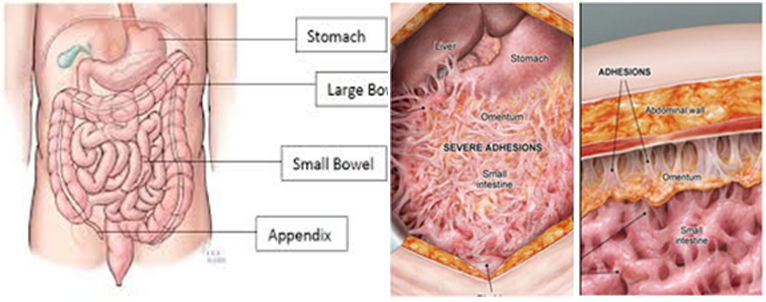Email
info@lgsc.co.uk
Email
info@lgsc.co.uk
Phone
0203 312 6130
Location
The Lindo Wing, St Mary’s Hospital,
Praed Street, London W2 1NY
Abdominal adhesions are bands of fibrous scar tissue that form on organs in the abdomen, causing the organs to stick to one another or to the wall of the abdomen.

In people living in developed countries, this scar tissue most commonly develops after abdominal surgery, in which organs are handled by the surgical team and are shifted temporarily from their normal positions. It can also form in people who develop peritonitis, an infection that has spread to the membrane that covers the abdominal organs. Peritonitis commonly occurs after appendicitis or another abdominal infection. Other causes of adhesions are abdominal trauma and endometriosis, an inflammatory condition that affects some women and may involve the abdomen.
In most patients, adhesions do not cause health problems. In a small number of people who have adhesions, however, the fibrous bands of scar tissue cause the intestines (bowels) to kink or twist either completely or partially leading to bowel obstruction. This necessitates surgery in small number of cases. Sometimes, an area of intestine that is affected by adhesions can keep becoming blocked then unblocked, causing symptoms to come and go. Occasionally, a portion of the bowel twists tightly around a band of adhesions in small bowel obstruction. This cuts off the normal blood supply to the twisted bowel, causing what is called "strangulation," and that section of bowel begins to die. When this emergency happens, urgent surgery is often necessitated.
Adhesions are fairly rare in patients who have never had abdominal surgery. In people who have had multiple abdominal surgeries, adhesions are common. At present, there are no effective preventative measures to avoid adhesions.
In most people, abdominal adhesions do not cause any symptoms. Adhesions that partially block the intestine from time to time can cause intermittent bouts of crampy abdominal pain.
More significant intestinal obstruction can cause the following symptoms:
Severe, crampy abdominal pain
Nausea and vomiting
Swelling of the abdomen (abdominal distension)
Inability to pass gas and absent or infrequent bowel movements
Signs of dehydration, including dry skin, dry mouth and tongue, severe thirst, infrequent urination, fast heart rate and low blood pressure
If the bowel becomes strangulated, people typically develop severe abdominal pain, which can be either crampy or constant. The abdomen is distended and tender when touched even lightly. People with a strangulated bowel usually also develop signs of systemic (body-wide) illness, such as fever, fast heart rate and low blood pressure.
The doctor to find evidence for the diagnosis examines the patient. Blood tests and X-rays of your chest and abdomen are ordered. A CT scan of abdomen and pelvis, or combination of multiple x-rays, is usually carried out to confirm the diagnosis, identify cause and location of obstruction.
Abdominal adhesions are permanent and do not go away unless the patient has abdominal procedure called adhesiolysis/freeing of adhesions from peritoneum. For patients with intermittent symptoms, a surgeon first attempts to conduct keyhole operation and uses instruments under to clip the fibers that have formed into adhesions and to remove as much of this scar tissue as possible.
Small bowel obstructions that are caused by adhesions require surgery in almost every case. In cases of partial bowel obstruction or complete bowel obstruction without severe symptoms, surgery may be delayed for 12 to 24 hours to allow a dehydrated patient to receive fluids intravenously (into a vein) prior to the operation. In this case, a small suction tube that extends through the nose and into the stomach can be used to prevent additional bloating and to relieve pain and nausea. When adhesions cause intestinal strangulation, immediate abdominal surgery is required to remove the adhesions so that blood flow to the bowel can be restored.
Abdominal adhesions can be treated, but they can be a recurring problem. Because surgery is both the cause and the treatment, the problem can keep returning. When surgery is done to remove an intestinal obstruction caused by adhesions, adhesions may form again and create a new obstruction in a small number of cases.

Please note, most insurance policies in the UK do not cover weight-loss surgery. However, we will do our utmost to provide the best package for you should you choose to have your surgery with us.
The contents on this site is for information only, and is not meant to substitute the advice of your own physician or other medical professional.